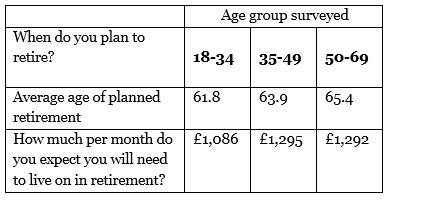Despite many workers starting to save earlier as a result of auto enrolment, future generations have a mismatch between expectations and reality as far as the timing of their retirement and the amount of savings they require. New research from mutual, Royal London, carried out with 4,000 adults in the UK, shows two-fifths of younger adults plan to retire by age 60.
An early retirement needs to factor in the amount of savings required to fund a much longer retirement, yet seven in ten (73%) under 35s admit they haven’t worked out how much they will need to live on when they retire.
Stopping work by age 60 would mean building a pension pot to sustain a retirement of up to three decades, or even longer. In some cases that may create a scenario where their retirement lasts longer than the number of years they worked.
At a time when individual responsibility for funding retirement is greater than it has ever been, it’s important to plan and set savings goals to be realistic about when you retire and how much is required to sustain your desired lifestyle.
Research from the Pensions and Lifetime Savings Association (PLSA) has set the benchmark for the amount of money required to achieve differing living standards in retirement. The figures suggest that, roughly speaking, a single person will need £13k a year to achieve the minimum living standard, £23k a year for moderate, and £37k a year for a comfortable standard of living, excluding housing costs.
Royal London’s research found that, on average, those under 35 years of age predict they will need £1,086 per month in retirement – an amount that would provide a minimum standard of living and would be mostly covered by the State Pension, which is currently £886 a month.

While it’s not easy to estimate the amount of income you will need every year for the rest of your life, the amount under 35s say they’ll need is likely to be a significant drop from their employment income level at age 60. On top of that, a considerable pension fund will be required to provide income in the years before these future retirees are eligible for their State Pension if they want to retire earlier than state pension age. Add to that, the PLSA figures don’t take any housing costs into account as it’s presumed a mortgage will be paid off before retirement, so any rent or mortgage costs will dramatically impact monthly costs.
Clare Moffat, pensions expert at Royal London, commented: “Being so far away from retirement, the younger generation have an optimistic view of when they’ll be able to give up work but there is a significant gap between expectations and retirement reality. Two-fifths of younger adults do not plan to work beyond 60 years of age, even though they won't qualify for a State Pension until much later, and that poses serious questions about how they will fund the type of lifestyle they want to enjoy when they’re older.
“While the thought of early retirement may be appealing, it also comes with a note of caution as it can carry significant risk. The more of your pension pot you take earlier in your retirement, the less there’s left to maintain lifestyle in later years.
“However, savers in their 20s and 30s have a couple of significant advantages on their side – time and compounding of their investments, which potentially enables small amounts of money to grow into larger sums over time. Early planning and setting realistic timescales and rates of pension saving is key, that way savings will accumulate earlier, building wealth over a longer period of time, and giving ambitious retirement goals a better chance of being met.”
|

